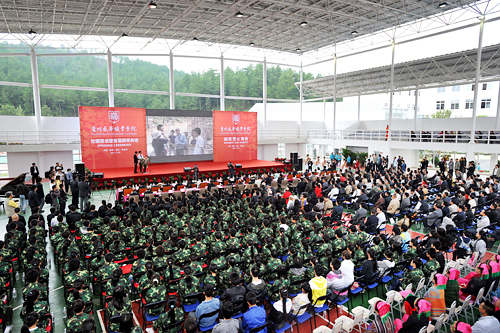|
 |
|
OFFICIAL LAUNCH: The Guizhou Forerunner College holds its opening ceremony on September 22 (CFP) |
"We can stand living in poverty, but we cannot stand missing opportunities to make our lives better and improve ourselves," said 19-year-old Sun Susu, a freshman at the Guizhou Forerunner College (GFC), while making a speech on behalf of her fellow students at the opening ceremony of the school's fall semester on September 22.
Sun and her peers are the first students to enroll in this three-year vocational college located in Guizhou, a land-locked province in China's southwest.
Funded by the VIA Faith-Hope-Love Non-Profit Foundation, an NGO, the newly established vocational institution claims to be China's first non-profit private college. According to the college's website, the school aims "to promote education equality in the western region of China, foster innovative teaching styles and stimulating classroom experiences." The college also houses the Bright Angel College for the Blind, a school dedicated to imparting a world-class education to visually impaired students.
All of the 170 inaugural freshmen come from Guizhou, which is known for its treacherous terrain and difficult farming conditions.
Harsh local weather and geographical conditions combined with Guizhou's isolation from China's industrial heartland have made it one of China's poorest provinces. In 2010, Guizhou's per-capita GDP stood at 13,221.4 yuan ($2,066), the lowest among China's provincial-level economies.
However, for the GFC's founders, the widespread poverty in rural Guizhou is an opportunity to introduce a new model of tertiary education, one that intends to provide the province's least well-off residents with a world-class vocational education.
"The GFC represents a new concept in higher education in China," said Sun Wei, Chair of the GFC, who also led the school's founding committee during its two years of initial preparation work.
"We are committed to lifting rural families in China's poorest areas out of poverty by teaching their children practical career skills for free and producing the moral citizens our society badly needs," Sun told Beijing Review. The college's motto is "integrity, love and nobility."
According to the college's development vision, more than one third of GFC's students will receive full scholarships; another third will receive half-tuition scholarships. Poor students who display academic excellence will also receive allowances to cover from 50-100 percent of the cost of living.
The Bright Angel College for the Blind, which specializes in training visually impaired students in physical therapy, will provide full tuition and living expense scholarships to its students.
Of the first cohort of 170 students enrolled this year, 143 students received full scholarships while another 17 received half-tuition scholarships. Only 10 students have to pay the full tuition of 6,500 yuan ($1,015.6) per year.
Tuition fees are a major disincentive for rural students who want to pursue tertiary education, according to a recent survey on tuition burdens conducted by the China National Center for Student Assistance Administration. Among the students surveyed, 91 percent feel that tuitions were too expensive.
"I am excited about my new job," said Tian Xingzhao, head of the GFC's Division of Student Services and Administration. He said that while working for another college, prior to joining the GFC, one of his responsibilities was to persuade students who couldn't afford their tuitions not to drop out of high education.
The GFC with its focus on educating underprivileged rural youth was made possible by a donation from Cher Wang, a highly successful IT entrepreneur and the richest person in Taiwan in 2011 according to Forbes magazine. Wang spent 180 million yuan ($28.1 million) to create a campus with state-of-the-art facilities that rival any university in Guizhou.
Sun worked with Wang in 2001-03.
Before joining the GFC to serve as its chair, Sun once worked as a tenured computer science professor at the State University of Florida at Miami. He is now also a professor and dean of the College of Software at Beihang University in Beijing, one of China's top engineering universities.
| 